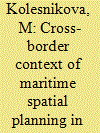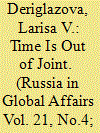|
|
|
Sort Order |
|
|
|
Items / Page
|
|
|
|
|
|
|
| Srl | Item |
| 1 |
ID:
169515


|
|
|
|
|
| Summary/Abstract |
USE OF THE SEA in the modern era is marked by the widespread use by coastal states of maritime spatial planning (MSP). In 2014, almost 40 countries developed or implemented territorial plans for delimiting offshore zones within national EEZs (exclusive economic zones*) and determining their industrial purpose. This practice is employed by states all over the world, including Australia, Israel, Canada, New Zealand, Norway, China, the U.S., the EU member states, as well as several other countries in Africa, Asia, Oceania, North and Central America [8, pp. 14 18].
|
|
|
|
|
|
|
|
|
|
|
|
|
|
|
|
| 2 |
ID:
185039


|
|
|
|
|
| Summary/Abstract |
THE TERM "politics of history" emerged as a category of political practice first in the 1980s in Germany and then in the 2000s in Poland. Russian historian Alexey Miller comments that the politics of history is a special set of methods involving the use of state administrative and financial resources in the field of history and politics of memory in the interests of the ruling elite [10, p. 19]. In practical terms, the politics of history is a political tool that aims to rally the nation around a historical narrative. In general, as the German historian Jan Assmann emphasizes, the politics of history studies public debates and political and administrative decisionmaking, and its essential characteristic is the adoption of normative legal acts
|
|
|
|
|
|
|
|
|
|
|
|
|
|
|
|
| 3 |
ID:
192500


|
|
|
|
|
| Summary/Abstract |
The current direct confrontation between Russia and the Western
countries in Europe was not unexpected, but its possible consequences
are frightening. In this article the author suggests looking at the conflict
between Russia and the EU through the lens of Aleida Assmann’s concept
of “temporal breach” in the “modern time regime” (modernity). One of
the reasons for the escalation is that the conflicting sides have different
visions of the past, present and future, as well as of their place in the new world. The author also traces the development of modernization theory and
analyzes the modernization practices Russia and EU countries chose to use
after 1991. Russia has largely been practicing conservative modernization,
where the state is the main actor relying on certain public demand. The EU
countries have been implementing a multi-vector liberal modernization
model in line with the goals of post-industrial society, with a variety of state
and non-state actors involved and the focus put on the human rights value.
|
|
|
|
|
|
|
|
|
|
|
|
|
|
|
|
| 4 |
ID:
192239


|
|
|
|
|
| Summary/Abstract |
European Union, and China through the concept of trilateralism from polarity theory. Following this model, we examine the three bilateral relationships of US-China, US–EU, and EU–China that make up this global triangle. Economic relations between the United States and China provide the operational framework for this triangle and should currently be viewed as a cooperative rivalry rather than a traditionally hostile one like that seen in the Cold War. The EU also plays a key role in the triangle due to its strategic autonomy and significance to the other two. We argue that relations in the global US–EU–China triangle can be characterized in terms of cooperation but do not exclude rivalry. These global trilateral relations are marked by flexibility and openness that encourage the development of relations with third countries.
|
|
|
|
|
|
|
|
|
|
|
|
|
|
|
|
|
|
|
|
|